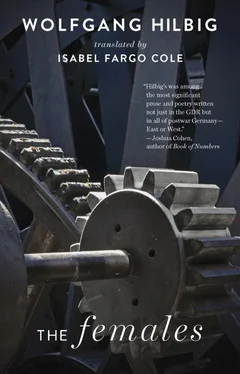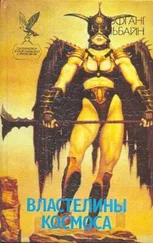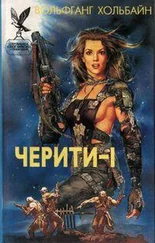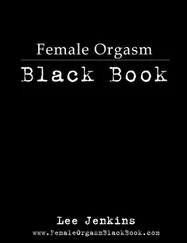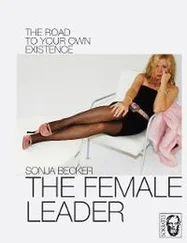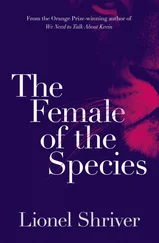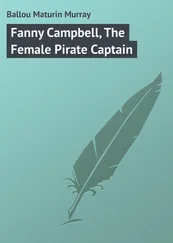The women never crossed the grate. Rarely, unexpected and quick as a flash, they’d skim some little corner of my vision: alas, they passed in twos or threes without ever setting a clog on the iron lattice, their shadows barely flitting over me; for a fraction of a second I’d hear their voices, an incomprehensible, indistinguishable chatter; they were contourless cylinders of darkness, speechless silhouettes wafting across me; all I could see were the objects they carried, pressed to their hips: large, evidently heavy cardboard boxes which alone could be clearly discerned hovering over the grate. I wouldn’t see the women again until they stopped at the stepladder by the waste mill. This was the long-awaited moment when I’d press my brow, my face against the grate to see—to see one of the two women climb the stepladder to lean forward over the mill hopper, at which I’d fail to notice a third woman following the first two with a bucket in her hand. It was the moment when the hem of the smock worn by the forward-leaning woman on the ladder seemed to slip far up the reddened backs of her thighs, when the smock’s flimsy synthetic fabric seemed to blaze in the light of the nearby window, in that white-hot thrust of sunlight; the moment when the heavy, slightly gaping buttocks must be revealed instantly, as if through some trick of physics in an incalculable second, soon, instantly, exposing a point of invisible darkness, the lightning-like moment when a hot drop of sun must inflame the nerves of the flesh that would be freed—I had no idea what I meant by that—and the moment in which the third woman following the other two indulged in a savage jest, doubtless repeated a hundred times over: with a mighty swing of her arms she tossed the contents of the bucket, five or six liters of cold clear water, in one sharp, perfectly calculated jerk of unthinkingly perfect aim, sending the water in a beeline through the burning air and under the smock of the woman on the ladder, right between the woman’s thighs, slapping the entire backside of the woman’s lower body, at which a shriek of amusement from the woman on the ladder immediately confirmed her most grateful acceptance—anticipated, but still startling—of the unerring bull’s-eye: oh what welcome coolness !; I saw nothing, I saw the surge of water rebound in spray; what I’d wanted to see was swamped, washed away and warped by water; as the water coursed to the ground, shot toward the grate and spilled into the basement through the iron lattice, I leaped from my chair to capture it with my cupped hands, which could not catch it, with my face, instantly spattered, with my nose, with my gaping mouth, as though I could grasp some trace—some barely perceptible bloom of femininity that might have been washed off and carried along, that, for all the rapidity of the incident, must have infiltrated the water a tiny bit—grasp it, devour it, retain it in a single pore of my skin, even if I never noticed. Nothing met my lips but dust washed from the floor, nothing clung to my hands but the fouled water’s gasoline smell, all I had in my nostrils was the burned-rubber smell, the inhuman smell of plastic which, cooled for a few seconds by the water, now tasted even more vivid and more obscene.
I had gradually begun to transform into a sickness. Like all things I produced, this transformation was utterly excessive; an agony not quite human, it was no longer that of an animal, either. It led to my dismissal from the factory, though the details aren’t worth mentioning; I lived in circumstances in which the symptoms outweighed the causes, or, rather, the causes kept transforming into the symptoms; I hid in my apartment by day and went out only at night, in the dark, roaming the town’s deserted streets, soliloquizing, holding rousing speeches to myself, sweating, covered with milky green pustules. A terrible thing had occurred, the worst thing ever to have happened since I’d learned to contemplate life from the outside, since I’d learned to use life to manufacture descriptions which made an inner life possible for me. A terrible thing, yet I was supposed to call it beauty. If I’d managed anything like it before… I’d always doubted I could… the discrepancy this time was most stark, it was appalling, nothing about the event could be transformed into a beautiful idea for my inner life. Earlier, I hadn’t minded making filth glitter; in earlier writings that I’d submitted for publication—that I’d submitted… I grinned… to pressure , or removed from myself in some other way, or that had been removed from me—the horrors had at least been palatable; I’d cloaked them in cheap mystification, and though I’d never been able to establish them on the market, at least their sale was being discussed. Oh, these lovely prisons—in words like these I’d described the trash cans on the street, described them not quite as useful, but as reflectors of magical moonlight, I’d made them gleam in the sun like big tins, I’d called their glitter silver .
But now something had happened that I couldn’t so easily bend to my will, not any sort of defilement, but rather a lack of richness, an especially painful loss; the town seemed to have suddenly shed a certain part of its makeup; at first I thought it had shed one of its smells. The insanity must have begun the day I was let go from the factory; since that day, at least, I’d felt the lack of some particular thing: venturing out in the evening I struggled for air, it was as though the air were drained of a special aroma, an aroma I needed in order to live. I sought the cause of this sensation; then came a suspicion that grew stronger, and soon I roamed for days at a time just to see how right I was, for nights at a time just to confirm my hideous suspicion: all the females had vanished from town . — It was no help at all to sense I was possessed by an obsession, in my overpotent head a cascade of letters blazed: all the females of the species had vanished from town, and with them had fled every trace of femininity. — Not only that, I felt that even feminine nouns had fallen out of use; I thought I suddenly noticed people in town referring to trash cans as der Kübel instead of die Tonne . When I saw those trash cans from afar, set up in long rows along the curbs that summer—something unlikely to change, as the trash collection service was still more dysfunctional then than in the winter—at first I’d think a line of unshapely females was loitering there, dully iridescent in the bluish streetlights, and I’d hurry toward them. I’d realize they were just the trash cans I saw every night, from their gaping orifices hung rubbish that looked hairy, that had some indefinable evil about it. I went so far as to impetuously embrace a trash can and lift it from the ground, as one sometimes does in the first ardent moments of reunion—that was possible at this time of year, when the containers generally held nothing but rotten fruit and crumpled paper, perhaps some old clothes—and confirmed that what I embraced was a cool, ugly bin of smeary metal that repelled me; I set it back on the ground with a crash and was surrounded by flies that had been resting in the rubbish of the containers and suddenly seemed to regard me as a better place, but then flew away in outrage when I snatched at them.
All the same, I often lingered near those trash cans; in a town like this, I thought, it’s from just such a receptacle that a woman, like foam-born Aphrodite, might emerge and rise into the light.
There had never been the least portent of the scandalous debacle I’d witnessed ever since I’d been let go: the disappearance of the females, I thought, must have happened swiftly: a radical, smoothly executed move, a hush-hush operation that met with no resistance; perhaps they’d vanished voluntarily and in unison; it was as though they’d dissolved into thin air, blown away by a wind I hadn’t noticed. Most likely it had happened the day I fled the factory in hideous confusion; that evening, upon entering the town—which for me was like returning to a place I’d believed lost—I’d immediately felt that the facts no longer corresponded with my memory, I smelled it with a hyena’s keen instinct. I asked myself if their disappearance bore a causal relation to my return, had they felt threatened by my increased opportunities to wander freely through the streets, had I frightened or repulsed them in some other way, had my arrival in town simply made them dissolve, couldn’t they tolerate the substance I was made of, was I some sort of antimatter to their matter? Was it just that I could no longer see… hear… smell them? I still had back in the factory, a so-called women’s factory employing only a few male specimens… unless I was mistaken. I was no longer sure whether I wasn’t mistaken on that point, whether even in the factory I’d ceased seeing, ceased discerning the women. For weeks I had hardly any doubt that I bore the blame for their flight, that what I called my return to outward life was, in their eyes, too monstrous an insult. But what about me was it? Was it the prospect of my ubiquitous threatening tirades that had scared them off; was it my appearance, my now-uncontrollable discolorations, the fact that I was growing darker and darker? Was it my lechery, some devious lust that excited me until I realized that it had no foundation, that I lacked the strength to make its ideas into reality? Was it my craving that repelled them, the smell of my dry craving, the thirst to see them constantly, to have them nearby; was it my hand, long since atremble with the inability to touch, even brush one of theirs? Was it my avarice, which made me collect their discarded tissues? Was it the noise of my gullet when draining my bottles? Was it the noise of my lashes, sinking the moment their fleeting gaze grazed me? Was it that I stood out by trying so doggedly to fade into the background? Oh, was it the howling that racked me at night when, with no hope of seeing a single one of them, I crept back to my room; was it my rabidity they sensed?
Читать дальше
